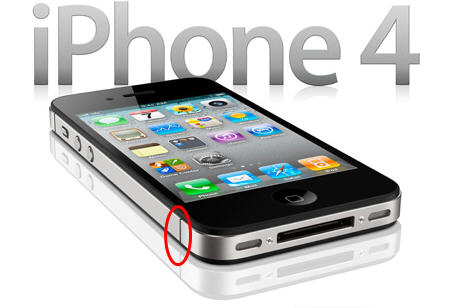
Consumer Reports says that touching the gap on the left side (photo from Verizon shows right side gap) can cause reception problems
For the second time in about seven months, Consumer Reports has taken a swipe at the iPhone 4’s antenna flaw.
The non-profit organization’s review of the Verizon iPhone 4 which appears free on its site (not all CR reviews are available online to non-subscribers) points out that like the AT&T version of the iPhone 4, the Verizon model “has a problem that could cause the phone to drop calls, or be unable to place calls, in weak signal conditions.” In testing, the researchers at CR found that “covering tiny gaps in the metal band that runs around the skinny edge of the Verizon iPhone caused “meaningful decline in performance.”
The flaw only manifests itself in areas of marginal reception and — as the magazine points out — can be completely avoided by not touching that part of the phone or by placing a rubber bumper around the case to prevent such contact.
As a result of this flaw, the magazine has proclaimed that “we are not including the Verizon iPhone 4 in our list of recommended smart phones, despite its high ranking in our Ratings.
In general I’m a fan of Consumer Reports — I like that they are not beholden to advertisers and that they purchase the products they review. And I’m far from an Apple fan-boy. I don’t even own an iPhone — I’m an Android user.
But that doesn’t mean that Consumer Reports is right. While in the best of all worlds it would have been good if Apple had fixed the antenna flaw before issuing the new Verizon phone, the flaw is hardly a reason to avoid getting an iPhone. I’ve seen iPhone compatible bumpers on sale for as little as $8. Or you could learn to avoid placing your hand over that little gap.
If you are inclined to get an iPhone — whether through Verizon or AT&T — its good to know that this is a small problem, but it’s a very small problem compared to the broader problems that affect all cell phones. Cell phones are two-way radios an like all radios, good reception is never something you can take for granted. Every cell phone from every carrier will drop calls for a variety of reasons. True, this antenna flaw is a bit unique to the iPhone but it’s so easy to avoid that its not really a reason to avoid getting the phone.

Larry Magid is a technology journalist and an Internet safety advocate. He serves as on-air technology analyst for CBS News, is co-director of ConnectSafely.org and founder of SafeKids.com and SafeTeens.com. He also writes columns that appear on CNET News, CBSNews.com, Huffington Post and the San Jose Mercury News.
His technology reports can be heard daily on CBS News and CBS affiliates throughout the U.S. and he has a daily tech segment on KCBS radio in San Francisco. He’s a regular contributor to BBC World Service and an occasional guest on National Public Radio’s Talk of the Nation. He is often called upon for commentary by CBS television news, CNN and Fox News and has appeared on the CBS Evening News, ABC World News Tonight, the Today Show and CBS Early Show. He has also been a frequent contributor to the New York Times and was, for 18 years, a syndicated columnist for the Los Angeles Times.
He has written several books including the best-selling Little PC Book and is co-author (with Anne Collier) of MySpace Unraveled.
Larry served on the Obama Administration’s Online Technology Working Group and the Berkman Center’s Internet Safety Technology Task Force.








